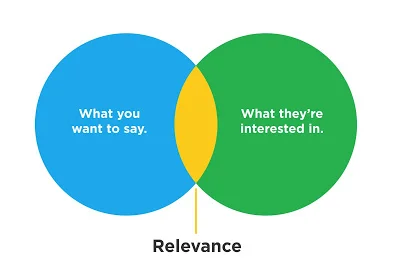How to Write Relevant Content
- SEO
- by Seth Pollins
- 02.13.2021

Search engines prefer relevant content. Warning webmasters about "little or no original content," Google suggests "relevant keywords":
"One of the most important steps in improving your site's ranking in Google search results is to ensure that it contains plenty of rich information that includes relevant keywords, used appropriately, that indicate the subject matter of your content."
Relevant content satisfies a browser's keyword search. Google's goal is to produce relevant results. Yet relevant content is more than keywords.
To think of relevant content strictly in terms of keywords--as many SEO firms do--is to limit what the best content can do. Yes, relevant content should satisfy a browser's query, but the best content also inspires visitors to return for more.
A website's design and development can be optimized with SEO. Content creation requires different ways of thinking. Perhaps for this reason, the term "content marketing" is often used to describe the "creative" work that online marketing firms historically attributed to SEO.
As Jayson DeMers notes in his piece on content marketing:
"Content marketing is the process of creating and distributing valuable pieces of content, whether they’re for information or entertainment value, for the purposes of growing an audience."
For content marketing, repeat visitors is key. What Demers calls "valuable content" here is what we call "relevant content." In both cases, the best content satisfies a browser's query while also offering a sense of "value," and possibly a "surprise" that intrigues visitors, inspiring them to return for more.
The SEO world offers many guides on creating "relevant content," and many suggest optimizing the technical aspects of your content, such as the meta tag, alt tag, and heading.
Keyword research is crucial. Before researching keywords, however, SEO guru Neil Patel suggests discovering your ideal user's intent: the user's goal when performing a query. This goal can be defined, Patel suggests, in three ways:
- Do something – commercial queries: “Buy a lawn mower online”
- Know something – informational queries: “2015 gas lawnmower customer reviews”
- Go somewhere – navigational queries: “Craftsman website”
What does your ideal customer want to do? And how will you help them do it?
When writing content, the goal for a good website is to produce content relevant to a specific audience. What is relevant for one brand's audience is irrelevant for another. Specificity is key.
After discovering user intent, keyword research is a relatively straightforward process that begins with common sense and ends with strategic thinking.
The point is to position your new content to compete against the current top ranking content. To do so, we suggest starting with a few working keywords, Googling the competition, using a keyword research tool, refining your keywords, and finally, Googling the competition for your new, refined keywords.
Provide True Value
It is important to match browsers with accurate queries--to give them what they're looking for. Unfortunately, most people in the SEO community are merely focused on satisfying a browser's query.
The purpose of relevant content is to provide value. Valuable content speaks precisely to a brand's core audience, defining, explaining, or meeting the audience's needs and desires. Valuable content can also compel an action--ideally a conversion.
To create valuable content think about the nature of the content: language, video, or pictures. Think about content that performs several functions at once. Excellent content might convey information about a product and make a connection to the reader.
To create relevant content, make sure each and every piece of content serves multiple purposes. This is especially important for websites whose content is perceived as marketing fluff. Do not write marketing copy. Write real content for real people Strive to make a connection.
The Element of Surprise
Relevant content feels necessary--content that stays with the browser after the experience. While being timely, relevant content aims to make an impression. To stand out from a surplus of timely content, offer meaning. Content that stays with people will inspire them to return for more.
However, to inspire repeat visitors, you must give the browser more than what they're looking for. Delight, like the best comedy, is a surprise. While satisfying and even delighting, great content can also transcend or even upend users' expectations.
You can tick all the SEO boxes--the tags and headers and keywords--while also offering an element of surprise. But here's the thing: Surprise should not be some artificial gesture; surprise can come from the content itself. The key is to be one-of-a-kind.
Offer a fresh take on a common theme. Say something new. Or, if you can, say it in a new way.
This is the essence of content that will feel genuinely relevant and inspire people to return for more.
Content Marketing with SEO Sparta
Do you currently have a content strategy independent of SEO? Does your brand create relevant content? SEO Sparta optimizes website worldwide and local websites near our Bucks County, PA, offices for content. We can help you build a content marketing strategy.
SEO Sparta combines traditional marketing methods and organic SEO, emphasizing natural website optimization--to design thoughtful, inspiring, and effective content marketing campaigns.
Contact us today. Or call to learn more: 215-900-9398.
If you are interested in transforming your website into a money-making tool or are interested in exploring opportunities to outperform your competition, we encourage you to contact SEO SPARTA.
We combine traditional marketing methods and organic SEO--emphasizing natural website optimization--to design thoughtful, inspiring, and effective marketing campaigns.
 For a limited time, we provide website design and development for just a one-time low fee of $499.
For a limited time, we provide website design and development for just a one-time low fee of $499.